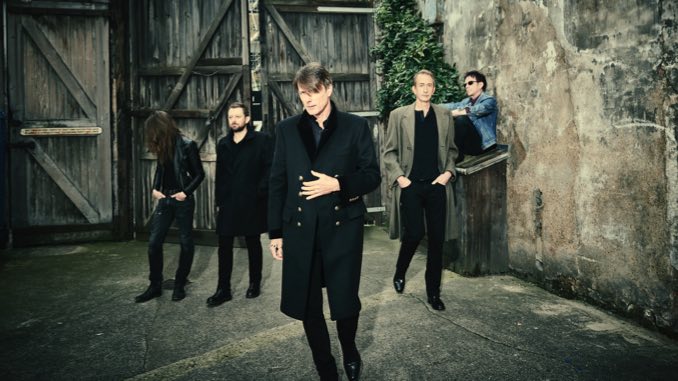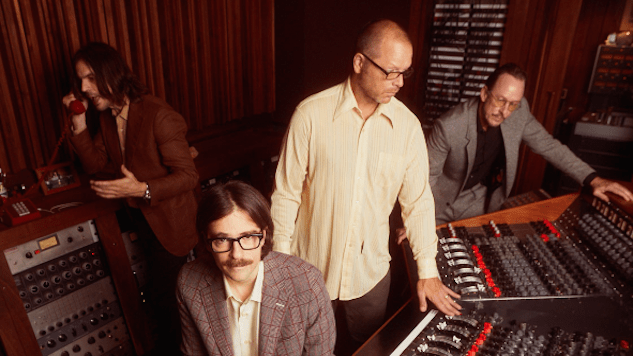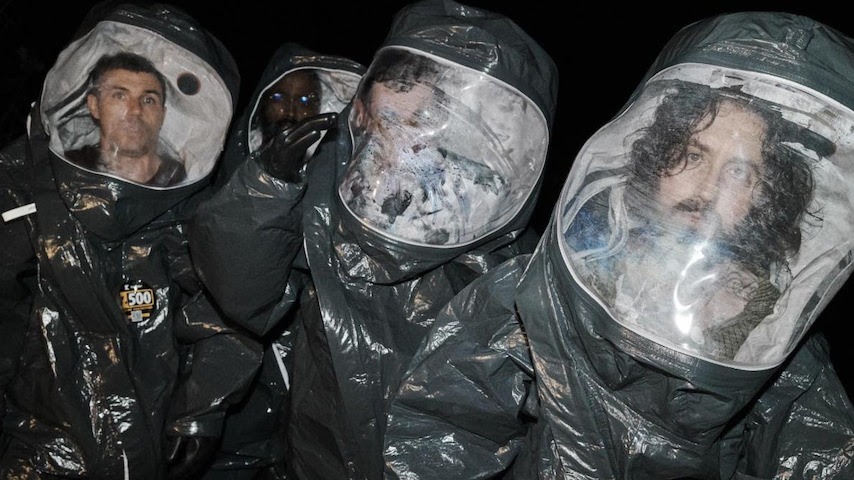After three decades in show business fronting British glam-punk combo Suede, or The London Suede, as they’ve been contractually re-christened in the States, Brett Anderson could easily have fallen prey to cynicism, meh-shrugging melancholia or complete loss of any novel sense of inspiration whatsoever. But remarkably, the still-whip-thin vocalist is absolutely on rejuvenated fire on Autofiction, the group’s majestic new album, its eighth. From the opening anthem “She Still Leads Me On,” an uplifting, almost tear-jerking ode to his late mother, Anderson is yelp-bellowing with the same Grand Guignol bravura he displayed way back in 1993 on Suede’s dramatic Britpop-era debut, the Mercury Prize-winning Suede. Underscored by the meaty, Will Sergeant-conversive axe work of guitarist Richard Oakes, who replaced departing founder Bernard Butler in 1994, songs like “Black Ice,” “Shadow Self,” “15 Again” and a sinister Gothic creeper ominously dubbed “It’s Always the Quiet Ones,” the disc is riveting, right through to the bass-heavy closing stomper, “Turn Off Your Brain and Yell.”
The album feels like it simply exploded out of one single dusk-to-dawn session, like a vintage Richard Gottehrer “Instant” Ramones record. But looks can be deceiving, Anderson counters. “I’m very proud of this record,” the singer says. “But it took quite a lot of work to sound this enthusiastic. This album took three years to write, and it’s so misleading that way, because it’s so live-sounding and fresh-sounding, people might mistakenly assume that we banged it out and wrote it quickly because of the sense of urgency that the record has.” Purposely, the lyricist steers clear of anything overtly political throughout Autofiction, no matter how inviting a topical target like exiting English prime minister Boris Johnson might be. “No, I leave that to people who are more qualified,” Anderson explains. “The microscopic is more interesting to me than the macroscopic, so for me to project my opinions onto people would be very naive, and a bit sixth form. But what I am an expert on, and what I feel I’m on safe lyrical ground with, are my personal relationships and the way I feel as a human being, and that’s the essence of songwriting, I think. So it’s very rare for songwriters to tackle big subjects and really do them justice—very rare. Great songs are about simple things— they’re about loss, they’re about regret, they’re about love, they’re about fame. They’re not about soil erosion, or farming in Kenya, you know?” On the eve of London Suede’s 2022 comeback, Anderson sat still long enough to discuss the implications of still being a popular—and vital—rock icon in his mid-50s.
Paste: Your mother died 30 years ago, you’ve said. So why did you choose to deal with her death now, lyrically, in “She Still Leads Me On”?
Brett Anderson: Well, I think I find writing about family really inspiring. You write about whatever you find passionate, and the thing that provokes the most passion—and I suppose anxiety, as well, because that’s the other side of that coin—is my family, so I write about them quite a lot. So that song, “She Still Leads Me On,” is a song about my mother, and it’s a song about loss but not about grief. It’s a song about how someone can give you strength even though they’re not around to physically provide it, and their memory can somehow guide you through life, you know? It’s supposed to be a very uplifting song in lots of ways, and it’s actually a companion piece to a song on the last album called “Life Is Golden,” which is a song I wrote for my son. That’s a song written from the parent to the child, and “She Still Leads Me On” is written from the child to the parent.
Paste: Obviously, you’re referring to lessons that you’ve learned from her. What do you instill in your son that your mom taught you?
Anderson: Ha! Both things are still a work in progress! What things do I instill in my son? Hmm … I know what things I try to instill in my son—resilience is one thing. And disrespect for money and status—that’s a very important thing to me. Cynicism of consumerism. And whether I’m successful in doing that or not is another matter, but these are the things I would like to instill, because those are worthy values.
Paste: There’s a distinct duality on this record. It sounds like you’ve separated yourself, personally, from your persona onstage. And what’s the difference?
Anderson: Oh, there’s a huge difference. An enormous one. And as you get older, that difference becomes wider and wider, bigger and bigger. When you first start in a band, the person onstage is the person you are, because that’s when the persona is almost captured as a public kind of entity. And as you evolve, the persona sort of stays the same because it sort of has to—it’s the performer, it’s the mask, and the person behind the mask kind of ages and evolves and becomes a different sort of person. And then when they go onstage, they put the mask on, and that might imply that there’s something fake about it. But it’s not fake—you just become that person again. But yeah, there’s a big difference between the person and the persona, absolutely. I don’t conduct my life in the same way I did when I was in my 20s. I can’t. And I wouldn’t want to—I think that would be kind of sad. That was one of the really key things about writing this album, was I wanted to write it from the perspective of a 55-year-old man. I wanted to write a rock record from the perspective of a 55-year-old man—I didn’t want to try and pretend I was a 20-year-old man again, because that would just be really sad. I didn’t want to be one of those aging rockers that kind of wears the clothes of a young person. I thought it would be much more interesting to write a rock record that deals with the anxieties of late middle age—or whatever I’m in now, 55, whatever you’d call that—and puts those into some sort of claustrophobic, tense sort of rock framework. I thought that would be much more interesting. But yeah—person versus persona is one of the themes on the record, I suppose. There’s another song called “What Am I Without You,” which is a love song to the audience, rather than a love song to a partner or whatever, and it asks that question: What is a performer without an audience? And I think that’s a really interesting question—whether art exists for its own sake, or whether it exists because it’s part of conversation. That’s a really interesting question that fascinates me. If you make a piece of art, if you write a song, for example, does the song need an audience in order for it to exist? And in a funny sort of way, I think it does.’
Paste: If a tree falls in the forest …
Anderson: Exactly. It’s a parallel to that question.
Paste: “Turn Off Your Brain” sounds like therapy-speak. Did you go through any therapy?
Anderson: Did I? Heh-heh … I have. But the last thing I want to do with myself is play the victim card and talk about myself and my problems and use that as leverage, because that’s what everyone seems to do these days. Everyone seems to unearth issues and want to talk about them. That’s how the modern media world works, isn’t it? We find skeletons in our closet and then we parade them publicly. But it’s not therapy-speak, actually—it’s just what I overheard on the radio. And what I do is, I overhear things and I read things, and I just write them down, and I write these fragments of conversations and then I use them in songs, I recycle them. So everything that’s in my songs is little bits of detritus from everyday life, little bits that I’ve heard, and I just put them all together. I throw them together in this impressionistic kind of way, and sort of try and project some sort of sense onto them. And that’s just something that I heard that I thought was a cool thing—“Turn off your brain and yell.”
It’s kind of like Burroughs’ cutup method, but then I try to impose some sort of order on it. I don’t use the cutup method as a deliberately surreal technique—I use it, but I impose a narrative on top of it.
Paste: For 55, you look really healthy. Do you have a whole new regimen you follow?
Anderson: Oh, I don’t know. I just kind of look after myself a bit more than I used to. You have to when you get older, don’t you? That’s your choice, and you have a choice. When you’re young, you don’t have to make those decisions because you have this sort of illusion of immortality. But as you get older, you have to make the choice—do you want to kind of decay and fall apart and die early? Or do you want to carry on living? And I love my life, but I don’t have a regimen or anything like that—I just try and be healthy, and that’s a different sort of thing.
Paste: But your wife is a naturopath? What does that entail for the family?
Anderson: It means she’s basically a modern-day witch—she has lots of potions and she kind of casts spells over me and stuff. But we’re not super-healthy health nuts or anything—we just kind of look after ourselves. We like a glass of wine, we like crisps, we eat shit sometimes. I’m just not destroying myself every night—it’s just a different kind of lifestyle. And I think when you’ve got kids, you’ve got to show them a bit of an example, and I don’t want my kids to see me sort of falling apart. I try and inspire them by example.
Paste: Thomas Mann once said that you can never go home again, or basically never return to the innocence of childhood. Is that what you address on “15 Again”? That saddening sense?
Anderson: There was an ancient Roman philosopher who said that no man can ever step into the same river twice, because he’s not the same man and it’s not the same river, and that’s a brilliant concept, isn’t it? That you can never quite do the same thing twice, because the circumstances are always infinitesimally slightly different, so it’s never going to be the same experience. So yeah, you can never go back, of course you can’t. That’s time travel, isn’t it? But “15 Again” isn’t really about that—it’s about those moments of joy in life that can happen at any age, really. I suppose I’m using the metaphor of age to prescribe that, but it’s not really necessarily about youth—it’s about feeling youthful, which can happen at any age.
Paste: What is “Black Ice,” exactly?
Anderson: It’s a slippery winter road that doesn’t look like it’s going to be slippery. It’s basically a metaphor—“We’re on the black ice with no headlights with our hands off the wheel.” It’s like being out of control, and about embracing that lack of control. It’s a song about control, about letting go, and how that can kind of be like freedom sometimes.
Paste: The guitar has a voice, a personality of its own on Autofiction.
Anderson: Yes. This for me is Richard’s greatest record, actually. And I think that it’s actually the first record where Richard’s real personality as a guitar player has shown through. I think on previous Suede records, he was always kind of in the shadow of Bernard [Butler, founding guitarist]—he was always sort of emulating the conventional Suede guitar sound that Bernard started. But I think this is the first Suede record where he’s able to show himself as a guitar player, and that his influences are very different—his influences are all these post-punk things like John McGeoch, Keith Levene, Siouxsie and The Banshees and all these people. But now, he’s made his own, I think, and it’s got Richard’s personality stamped all over it, this record. So I agree with you—the guitar playing is absolutely brilliant, and really inspiring. And he’s been amazing, Richard—he’s gone on to a new level as a writer, I think, and the kind of music he’s presenting me now is just absolutely brilliant. I’m so excited about working with Richard now—it’s amazing.
Paste: On a side note, are you ever still in touch with Bernard?
Anderson: Oh, you know, not as much as I used to be. He’s doing his own thing, we’re doing our thing, it’s cool. We don’t work together anymore, but there’s nothing wrong, there’s no bad blood in it.
Paste: When do you do most of your songwriting? Are you nocturnal?
Anderson: When does the inspiration hit? I’m not nocturnal, really—I come up with little fragments of ideas in the middle of the night sometimes, but when I work, I work very regimented, from half past 10 in the morning. I work from school drop-off to school pickup—I work those hours, so there are four or five key hours in the day when I’m working. But I look at writing like this—the analogy is fishing. Unless you’re going to sit by the river with your rod in the water, you’re not going to catch a fish, right? So I’m sitting there, throwing ideas at my songs, and sometimes I catch a fish, and sometimes I sit all day by the river and I don’t catch anything. But you’re not going to catch anything unless you’ve got your rod in the water. You’re not going to write a song unless you’re trying, do you know what I mean? Songs aren’t magical like that. Once in a lifetime, you get those songs that just descend on you, but that happens once every 10 years, once every fucking generation. Most of the songs that you write are fucking hard graft of piecing these little bits of verses together and seeing if these bits of chorus work. It’s much less romantic than people would assume.
Paste: How did Autofiction morph into an eponymous short film from Katie Lambert, aka MrMr?
Anderson: Every time you make an album and release a single, you’ve got to make a video for it. So this was really a way to make a video that was a little less conventional than the normal thing. So I liked the idea of making a video that was a short film, and one that didn’t feature the band as the primary focus—it featured a narrative based around fictional characters, almost like it was members of the audience. And it was focusing on them rather than members of the band, and I thought that was an interesting shift of focus. I thought it was an interesting thing to do, and you’re always looking for things like that. The idea of just doing the same shit, over and over again? We’re 30 years on now—it’s been 30 years of making records, which is quite a long time. And of course, there are bands that have been together longer than that. But I don’t know if there are bands that have been together as long as that that are still making interesting music, so I’d like to think we’re in the minority there, to be honest.
Paste: Do you feel like a survivor? Or what other word would you use?
Anderson: I suppose so. If you asked me directly, I suppose that technically, we’re survivors, yeah. But I dunno. I don’t really have that kind of hubris anymore. That implies that I’ve kind of like defeated someone or something, and I don’t care about that bullshit. I don’t think in that sense of competition—it’s not a zero-sum game for me. We just carry on making music because we love doing it—it’s not some, “Fuck you! We’re still here” sort of thing. It’s just that we’re loving making music, and we’ll carry on making music until it gets boring or we run out of ideas, you know?
Autofiction
is out now on BMG.
Listen to a 2013 Suede performance from the Paste archives below.




